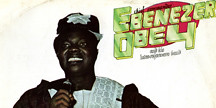
The late George Plimpton, consummate boulevardier and enthusiast-without-boundary, enjoyed fireworks as have few others. His 1984 book, Fireworks, A History and Celebration, is still considered the defining tome on the subject. Late in his career, Plimpton was appointed Commissioner of Fireworks for New York City, a position created especially for the 6' 4", plummy-voiced polymath. "They're wonderful, fireworks," Plimpton once told Michiko Kakutani of The New York Times, "You set fire to a fuse and there, suddenly, is everything a writer or artist wants to do. The crowd cheers and the sky lights up — you've elicited an immediate reaction."
Much as I doubt that Plimpton, editor of The Paris Review, occasional advertising pitchman and one-time Detroit Lion, had any significant encounters with African pop music, I wouldn't put money against it. George Plimpton could be counted upon to turn up wherever it was assumed that he wouldn't. Had the man whom John Wayne insisted on calling "Plankton" actually heard Chief Commander Ebenezer Obey and His Inter-Reformers Band, he might have recognized the incendiary energy common to both roman candles and the Nigerian approach to pedal steel guitar.
Whether Ebenezer Obey or King Sunny Adé was the great innovator of juju is possibly still open to debate. Obey certainly was in the game a few years earlier than Adé, and was a guiding force behind the minting of a genuinely Nigerian pop music; in the early '60s, highlife rhythms imported from neighboring Ghana still ruled local dance floors. Obey formed his first group, the International Brothers, in 1964. That group became the Inter-Reformers Band by 1970. By that point Obey & Co. were in the habit of completing four or more albums per annum.
Ebenezer Obey never found the connection to Western audiences enjoyed briefly by his rival, King Sunny Adé. In the first throes of enthusiasm for all things African as the '70s ended, Obey was signed by Virgin Records (as always, the Avis to Island Records' Hertz, Sunny Adé already having been signed to Island) but little came of it. Still, Obey enjoyed huge sales in Nigeria and has maintained a consistently prolfic output down the years. Having recounted as much, I'll admit that Joy of Salvation is the only one of his albums to have engaged me on par with my affection for any number of Sunny Adé's long-players.
[An editorial aside: The notion of spiritual absolutism in any form is anathema to this sensible hedonist, yet I am willing to allow for Chief Commander Obey's lyrical obsession with morality, honesty and the principal characters of the Bible because (1) his music brims with pagan vitality seemingly at odds with its ecclesiastical text and (2) he's singing in Yoruba, which makes it that much easier for me to ignore whatever deity-dedicated message he's putting across.]
About ten years ago, Chief Commander Ebenezer Obey and his 18-strong Inter-Reformers Band arrived in Los Angeles for a rare concert appearance. This event was marred from the get-go by the worst concert sound I'd encountered up to that point in time, or since for that matter. Horrendously loud and distorted in equal measure, Obey's P.A. drove the entire audience — even the African expat crowd — outdoors to the theater's patio. The Inter-Reformers almost sounded good when heard outside the building. I'd sneak back into the hall at intervals, where I'd spy a well-known DJ, a local eminence gris of world music, gamely grooving by himself in the near-empty hall. Even as I marveled at his perseverance, it seemed all too likely that the upper range of his hearing could vanish then and there. For my part, to paraphrase Don Marquis' Archy the cockroach, I'll take half the volume and twice the longevity as regards my own perception of treble frequencies. And so I retreated once more to the patio, there to ogle the solidly constructed Nigerian beauties in their Sunday best, complete with elaborately folded headpieces made from Japanese washi paper. Fantastic!
I'll let you set the volume for Joy of Salvation, all the while advising (slightly) louder is better as befits cheap electric guitars drenched in signal processing. And be sure to check Ebenezer's pedal steel player, his left wrist flexing like the tail of a moray eel. Our next installment, hopefully turning up sooner than did this one, lures NCIP and its constituency to Morocco. Please stay tuned.
JOY OF SALVATION (@ 160)
(vinyl courtesy of Dan Meinwald, E.A.R. USA)
Comments
Good to see that you are back! This is, hands down, my favorite blog on the web. Thanks for all the work; you're earning mad karma points...
Peace.
Thanks a lot.
Aduna
The writing is so good, even though your posts are less frequent than my interest.
We appreciate the amount of time and effort you obviously put into every entry, but still wish for the next one.
Thank you
Thank-you thanks thanks
This music has elements in it that I've known in separation in all music as well as my imagination as to how music *could* sound. I'm not that surprised to find that they've all been brought together, but I wouldn't have guessed that it was in African music that they were finally joined up.
There's some things from jazz, without the cerebral masturbatory curse of white western academia but all the freedom, and some of the best things about krautrock. It's what I've always been trying to hear in Stereolab, Neu and Can, for instance. With some success, but this stuff finally makes it gel.
Looking forward to the next installment.
I assume you've heard recent news of Rev. Obey?